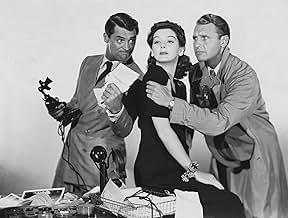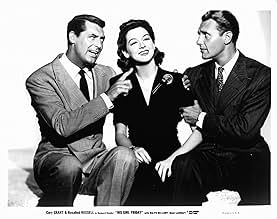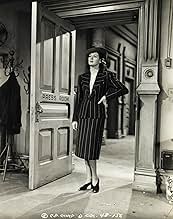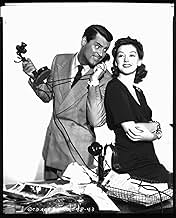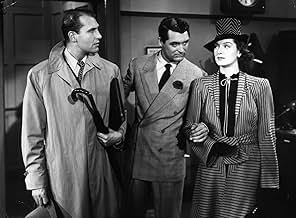IMDb-BEWERTUNG
7,8/10
66.249
IHRE BEWERTUNG
Ein Zeitungsredakteur versucht mit allen möglichen Tricks, die Ex-Frau seines Starreporters davon abzuhalten, diesen noch einmal zu heiraten.Ein Zeitungsredakteur versucht mit allen möglichen Tricks, die Ex-Frau seines Starreporters davon abzuhalten, diesen noch einmal zu heiraten.Ein Zeitungsredakteur versucht mit allen möglichen Tricks, die Ex-Frau seines Starreporters davon abzuhalten, diesen noch einmal zu heiraten.
- Auszeichnungen
- 5 Gewinne & 1 Nominierung insgesamt
Empfohlene Bewertungen
A very, very funny movie, this rapid-fire farce combines a terrific cast, a great script, and a plot that lends itself wonderfully both to comedy and satire. There are more funny lines and good gags than you can count, even when you've already seen it a few times.
Cary Grant is excellent at this kind of manic comedy, and Rosalind Russell gives what had to be one of her very best performances, as a worthy foil for Grant's domineering character. Ralph Bellamy is also ideal as the naive insurance salesman, and they are backed up by a cast filled with fine comic character actors. Some of the supporting cast do a terrific job of getting laughs with very limited screen time. They all get great material to work with, too. The dialogue is just amazing, with funny, creative lines coming constantly - sometimes literally on top of each other. The setting and the plot create hilarious situations and some great opportunities to satirize politicians and the news media. If anything, the satire is even funnier and more appropriate as regards today's institutions than it was in 1940.
"His Girl Friday" is absolutely hilarious, a classic comedy that you can watch and enjoy over and over.
Cary Grant is excellent at this kind of manic comedy, and Rosalind Russell gives what had to be one of her very best performances, as a worthy foil for Grant's domineering character. Ralph Bellamy is also ideal as the naive insurance salesman, and they are backed up by a cast filled with fine comic character actors. Some of the supporting cast do a terrific job of getting laughs with very limited screen time. They all get great material to work with, too. The dialogue is just amazing, with funny, creative lines coming constantly - sometimes literally on top of each other. The setting and the plot create hilarious situations and some great opportunities to satirize politicians and the news media. If anything, the satire is even funnier and more appropriate as regards today's institutions than it was in 1940.
"His Girl Friday" is absolutely hilarious, a classic comedy that you can watch and enjoy over and over.
This gloriously funny romp by Howard Hawks is rightly remembered as one of the fastest-talking movies ever made. Originally done as 'The Front Page', the play by Hecht and McArthur takes on new life here as the character of Hildy Johnson metamorphoses in this version to be a sparky woman (played by Rosalind Russell), former wife of the harassed columnist Walter Burns (played with characteristic bewilderment and charm by Cary Grant). Hildy is about to marry again, to the nice but dull Bruce Baldwin (played by Ralph Bellamy as a character so boring he 'is like Ralph Bellamy' - how Hollywood liked its in-jokes).
With that fire-cracking script, a sizable amount of sparks between Grant and Russell, and good support from Bellamy and a cast which includes Gene Lockhart, Cliff Edwards, Clarence Kolb, and Regis Toomey, 'His Girl Friday' is one of those classic gems which never age and which remain hugely entertaining.
With that fire-cracking script, a sizable amount of sparks between Grant and Russell, and good support from Bellamy and a cast which includes Gene Lockhart, Cliff Edwards, Clarence Kolb, and Regis Toomey, 'His Girl Friday' is one of those classic gems which never age and which remain hugely entertaining.
If Howard Hawks's screwball classic "His Girl Friday" isn't a perfect film, it had at least a perfect role for Cary Grant and Rosalind Russell... and that's the stuff durable greatness is made of.
Indeed, Grant was the epitome of wisecracking charm and his Walter Burns happened to be an obnoxious fellow delivering so many wisecracks that by the time the receiver found the proper repartee, someone was already being verbally crucified.
Rosalind Russell wasn't a star... yet... until she portrayed Burns' ace reporter and ex-wife Hildy Johnson, reliable and relatable 'girl Friday'. These two backgrounds explain why she plays in the same rhetorical league, she's a match to him... even when there's no matching anymore.
But maybe because she's taller than many actresses, she can get above Grant's shoulder high enough not to be totally swollen off by his charismatic despicability. She talks the talks but can walk the walk even if he's gallant enough to hold her the door... but why would a woman calling herself a newspaperman expect gallantry?
At a time where gender talk wasn't such a sensitive subject and this is where the film got tricky, Hildy is engaged to insurance agent Bruce Baldwyn and is determined to become his devoted housewife, to have children and live a peaceful life in Albany, of all the towns... so she expects some gentlemanly behavior from her editor and former husband... might as well expect Hitler to sign a Peace Treaty.
The titular 'Girl Friday' can't wait for her existential 'week-end', torn between her job and her future. The way the film makes these two situations irreconcilable can seem far-fetched but given the way Hildy handles her job, it's hard to imagine the combo. The lady must make up her mind. Meanwhile, Burns gets an opportunity that instantly tilts in his mind "thanks God, it's Friday!".
As usual with screwball comedies, the timing is crucial and when a top reporter is missing and an execution is polarizing opinions because of proclaimed insanity and suspicion of political motivations, someone must cover the news and Hildy happened to be in the right place at the right moment.
For Walter, Hildy's presence is to be exploited even if it means using every bit of his malevolent creativity against the gentle but rather bland Bruce... who looks exactly like Ralph Bellamy, according to Burns (or was it Grant having fun with the script?). Given the mistreatment poor Bruce undergoes, "His Girl Friday" is a tale of Machiavellian ingenuity at the services of one profession: journalism. Basically, the ends justify the means if it means covering the hottest topic of the day (pre-war days but they didn't know).
So Burns uses every trick of his sleeve to prevent Bruce from taking the train and forces Hildy to be on the front... and for the front, fully aware that her professional conscience will finally get the best of her. And there is something in Russell's performance, the way she resists the call of her profession while being fiercely attached to her fiancée that calls for admiration.
Whether she handles the other journalists who pose like vulture-like creatures, indifferent to the pleas of Williams' friend and hungry for any scandal or tip to it, she knows how to adapt her manners, to talk different languages, but that would be too easy with screwball comedy. We noticed from the start that the pace of the dialogue is as quick as if the box office depended on it, yet Hawks gratifies us with scenes where journalists and Burns are all together, sometimes, Bruce and Walter talk to Hildy and on the phone and the rhythm is so fast it sounds like harmonious cacophony.
The film was known for having a dialogue that could be contained in a twice longer film but Hawks insisted on having something natural that could flow simply and easily because people did talk like this in real life. And only for the rapid fire delivery of Russell, I'm glad they didn't take someone else, I can't imagine Katharine Hepburn in that role, Russell had the street smarts, the modern touch, the look, the sexiness... she got the scandal but the only thing she didn't get was an Oscar nomination, and that was a scandal too.
I didn't like the film at first because I have a problem with the schematic aspect of screwball comedies, the two men in love with the same woman and one of them has no chance because the other is Grant, that's why I didn't like "The Philadelphia Story"... but here, Grant is so unlikable you've got to wonder how come he had to get Russell at the end except to show that these two were equally unlikable thus meant to be together, which in that case makes the film modern in its daring anti-family bias.
And the ending doesn't imply that Hildy made the right personal choices, maybe journalists have a way with every non-personal matters but are totally ignorant of the things of life. I recently saw "Sweet Smell of Success" and I guess it's a common trope of Hollywood to depict journalism as a business dealing with cops, politicians, uses of bribes or blackmails and many methods that can only give it a cynical flavor.
Grant could embody these traits without being totally detestable, maybe it's because we try to see them from the eyes of Hildy and we accept that he's not such a bad guy after all. Ironically, when Hildy becomes the newspaper man, she lets the woman takes the upper hand and encourage Burns to show a more comprehensive and gentle side. But Hawks was a smart director, if he was smart enough to know that he could remake "The Front Page" with a gender swap, he could handle his characters as well.
After all, they might be unlikable but they have a likable way to be unlikable, and that's also the stuff durable greatness is made on.
Indeed, Grant was the epitome of wisecracking charm and his Walter Burns happened to be an obnoxious fellow delivering so many wisecracks that by the time the receiver found the proper repartee, someone was already being verbally crucified.
Rosalind Russell wasn't a star... yet... until she portrayed Burns' ace reporter and ex-wife Hildy Johnson, reliable and relatable 'girl Friday'. These two backgrounds explain why she plays in the same rhetorical league, she's a match to him... even when there's no matching anymore.
But maybe because she's taller than many actresses, she can get above Grant's shoulder high enough not to be totally swollen off by his charismatic despicability. She talks the talks but can walk the walk even if he's gallant enough to hold her the door... but why would a woman calling herself a newspaperman expect gallantry?
At a time where gender talk wasn't such a sensitive subject and this is where the film got tricky, Hildy is engaged to insurance agent Bruce Baldwyn and is determined to become his devoted housewife, to have children and live a peaceful life in Albany, of all the towns... so she expects some gentlemanly behavior from her editor and former husband... might as well expect Hitler to sign a Peace Treaty.
The titular 'Girl Friday' can't wait for her existential 'week-end', torn between her job and her future. The way the film makes these two situations irreconcilable can seem far-fetched but given the way Hildy handles her job, it's hard to imagine the combo. The lady must make up her mind. Meanwhile, Burns gets an opportunity that instantly tilts in his mind "thanks God, it's Friday!".
As usual with screwball comedies, the timing is crucial and when a top reporter is missing and an execution is polarizing opinions because of proclaimed insanity and suspicion of political motivations, someone must cover the news and Hildy happened to be in the right place at the right moment.
For Walter, Hildy's presence is to be exploited even if it means using every bit of his malevolent creativity against the gentle but rather bland Bruce... who looks exactly like Ralph Bellamy, according to Burns (or was it Grant having fun with the script?). Given the mistreatment poor Bruce undergoes, "His Girl Friday" is a tale of Machiavellian ingenuity at the services of one profession: journalism. Basically, the ends justify the means if it means covering the hottest topic of the day (pre-war days but they didn't know).
So Burns uses every trick of his sleeve to prevent Bruce from taking the train and forces Hildy to be on the front... and for the front, fully aware that her professional conscience will finally get the best of her. And there is something in Russell's performance, the way she resists the call of her profession while being fiercely attached to her fiancée that calls for admiration.
Whether she handles the other journalists who pose like vulture-like creatures, indifferent to the pleas of Williams' friend and hungry for any scandal or tip to it, she knows how to adapt her manners, to talk different languages, but that would be too easy with screwball comedy. We noticed from the start that the pace of the dialogue is as quick as if the box office depended on it, yet Hawks gratifies us with scenes where journalists and Burns are all together, sometimes, Bruce and Walter talk to Hildy and on the phone and the rhythm is so fast it sounds like harmonious cacophony.
The film was known for having a dialogue that could be contained in a twice longer film but Hawks insisted on having something natural that could flow simply and easily because people did talk like this in real life. And only for the rapid fire delivery of Russell, I'm glad they didn't take someone else, I can't imagine Katharine Hepburn in that role, Russell had the street smarts, the modern touch, the look, the sexiness... she got the scandal but the only thing she didn't get was an Oscar nomination, and that was a scandal too.
I didn't like the film at first because I have a problem with the schematic aspect of screwball comedies, the two men in love with the same woman and one of them has no chance because the other is Grant, that's why I didn't like "The Philadelphia Story"... but here, Grant is so unlikable you've got to wonder how come he had to get Russell at the end except to show that these two were equally unlikable thus meant to be together, which in that case makes the film modern in its daring anti-family bias.
And the ending doesn't imply that Hildy made the right personal choices, maybe journalists have a way with every non-personal matters but are totally ignorant of the things of life. I recently saw "Sweet Smell of Success" and I guess it's a common trope of Hollywood to depict journalism as a business dealing with cops, politicians, uses of bribes or blackmails and many methods that can only give it a cynical flavor.
Grant could embody these traits without being totally detestable, maybe it's because we try to see them from the eyes of Hildy and we accept that he's not such a bad guy after all. Ironically, when Hildy becomes the newspaper man, she lets the woman takes the upper hand and encourage Burns to show a more comprehensive and gentle side. But Hawks was a smart director, if he was smart enough to know that he could remake "The Front Page" with a gender swap, he could handle his characters as well.
After all, they might be unlikable but they have a likable way to be unlikable, and that's also the stuff durable greatness is made on.
Charles McArthur and Ben Hecht met when both were reporters in Chicago during the 1920s. They created two of the funniest farces in American drama, TWENTIETH CENTURY (about theater people) and THE FRONT PAGE. The latter was based on their experiences as news reporters in those crazy days in Chicago, where the newspapers concentrated on sensationalism and the politics was thoroughly corrupt. The resulting play is hysterically funny and yet remains timely. For all the exaggeration of how Walter Burns and Hildy Johnson manipulate police, politicians, reporters, and civilians to get their scoop, the story remains relevant for several reasons. The political balance in a big Mayoralty election is precarious due to the Earl Williams case. Williams has shot a policeman who is African-American, a big local voting block, and they want him punished. The corrupt Mayor and his idiot jail warden are willing to execute him for the votes needed to stay in office, but the Governor (who is from the rival party) believes the killer is insane (or at least mentally deficient). So already (as you see) race, politics, and the validity of the death penalty get pulled in. Soon we also see examples of nepotism and corruption in the police, and City Hall, cynical politics based on a man's life, and questions about privacy and a free press. For a play from 1931 this one still has relevance.
There had been an earlier version of the play in the 1930s called THE FRONT PAGE, starring Adolphe Menjou as the conniving and devious Walter Burns, and Pat O'Brien as ace reporter Hildy Johnson. It is a good version, and both stars do well with their parts (and both have the verbal speed necessary for the dialog to flow over the ears of the audience). But when the film was remade in 1940, Howard Hawks decided to redraw Hildy Johnson into a female reporter (and previous wife) of Burns. His casting of Cary Grant was radically different too. Burns is a nasty, conniving s.o.b. who would kill for a good story. Menjou was somewhat dapper (he was usually dapper) in the role, but the hardness under the presentable shell was there. And by changing Hildy from a guy to a gal, and Walter's former wife, you had to make Walter look more interesting. So Walter is turned into Cary Grant. There was a search for Hildy, involving Jean Arthur and Irene Dunne as possibilities. Neither ended up playing him. Instead it went to Rosalind Russell.
It has to be admitted Russell had the vocal abilities to push the dialog at the proper clip. Possibly Jean Arthur could have done that just as well, but Arthur did not have the apparent physical strength behind the stylishness that Russell showed. She really does balance well (in this film) with Grant, given their characters.
Motivation changes a little. This Walter Burns still wants to get his scoops, but there are moments of fragility when he realizes he may forever lose Hildy to her fiancé Bruce (the ever helpless Ralph Bellamy). And they oddly work (Hawks manages to keep them under control). Also, as the story is now twelve years older than the original play, certain changes occur in Walter's political views. He does dislike the gang (led by Clarence Kolb and Gene Lockhart) running the city, and points out to Hildy that they have a chance to help give the city the sort of government New York City has under La Guardia. This does not end his joy at scooping the opposition, but it does suggest that Burns has more depth.
It is now generally believed that this is the best of the film versions of THE FRONT PAGE, and one of the funniest films ever made. The entire cast shines (look at the scene where Helen Mack confronts the reporters who have made her look like a tramp, and have told lies about John Qualen (Williams) - she is in a state when Russell takes her out of the press room, and the reporters are thoroughly ashamed of herself - and Russell comes back looking at Regis Toomey, Porter Hall, and the others, and says "Gentlemen of the Press!" with heavy cynical irony). And also note Billy Gilbert's immortal Joe Pettibone, the most hopeless monument of total befuddlement in movies. It is one of the few film comedies of that period that retains it's laughs one viewing following another.
There had been an earlier version of the play in the 1930s called THE FRONT PAGE, starring Adolphe Menjou as the conniving and devious Walter Burns, and Pat O'Brien as ace reporter Hildy Johnson. It is a good version, and both stars do well with their parts (and both have the verbal speed necessary for the dialog to flow over the ears of the audience). But when the film was remade in 1940, Howard Hawks decided to redraw Hildy Johnson into a female reporter (and previous wife) of Burns. His casting of Cary Grant was radically different too. Burns is a nasty, conniving s.o.b. who would kill for a good story. Menjou was somewhat dapper (he was usually dapper) in the role, but the hardness under the presentable shell was there. And by changing Hildy from a guy to a gal, and Walter's former wife, you had to make Walter look more interesting. So Walter is turned into Cary Grant. There was a search for Hildy, involving Jean Arthur and Irene Dunne as possibilities. Neither ended up playing him. Instead it went to Rosalind Russell.
It has to be admitted Russell had the vocal abilities to push the dialog at the proper clip. Possibly Jean Arthur could have done that just as well, but Arthur did not have the apparent physical strength behind the stylishness that Russell showed. She really does balance well (in this film) with Grant, given their characters.
Motivation changes a little. This Walter Burns still wants to get his scoops, but there are moments of fragility when he realizes he may forever lose Hildy to her fiancé Bruce (the ever helpless Ralph Bellamy). And they oddly work (Hawks manages to keep them under control). Also, as the story is now twelve years older than the original play, certain changes occur in Walter's political views. He does dislike the gang (led by Clarence Kolb and Gene Lockhart) running the city, and points out to Hildy that they have a chance to help give the city the sort of government New York City has under La Guardia. This does not end his joy at scooping the opposition, but it does suggest that Burns has more depth.
It is now generally believed that this is the best of the film versions of THE FRONT PAGE, and one of the funniest films ever made. The entire cast shines (look at the scene where Helen Mack confronts the reporters who have made her look like a tramp, and have told lies about John Qualen (Williams) - she is in a state when Russell takes her out of the press room, and the reporters are thoroughly ashamed of herself - and Russell comes back looking at Regis Toomey, Porter Hall, and the others, and says "Gentlemen of the Press!" with heavy cynical irony). And also note Billy Gilbert's immortal Joe Pettibone, the most hopeless monument of total befuddlement in movies. It is one of the few film comedies of that period that retains it's laughs one viewing following another.
10robb_772
As if creating one comedic masterpiece with 1938's BRINGING UP BABY was not enough, director Howard Hawks returned to the same genre a scant two years later - and he somehow managed to rival even his own previous masterwork. Nominally a reworking Ben Hecht and Charles MacArthur's play THE FRONT PAGE, HIS GIRL Friday manages to surpass it's classic source material and emerge as one of the screen's finest comedies. The film is also perhaps the perfect example of Hawks' trademarked rapid-fire, overlapping dialogue, which has never been as fast nor as furious anywhere else before or since. This is certainly one of the fastest moving comedies ever filmed, and the whole cast never misses a beat.
Walter Burns, the conniving, self-serving newspaper editor, is a character that could have easily come off as a tyrannical jerk. As portrayed by the suave Cary Grant, however, the pompous, arrogant Burns actually becomes (gasp!) likable! It is a difficult balancing act that Grant must perform as teetering between the two extremes of the character, and he is arguably the only actor imaginable with the skill and charisma to pull such a tricky characterization off this successfully. And the one-and-only Rosalind Russell is every bit his match - full of verve and aplomb, Russell's Hildy is an independent career woman, brimming with intelligence and class, that impressively pre-dates the major feminist movement of the mid-sixties by a good 25 years.
The film's supporting cast is no less impressive, with every single role cast to perfection. This is particularly true of Ralph Bellamy, who (along with his Oscar-nominated performance in 1937's THE AWFUL TRUTH) proves once again that he is the ultimate straight man. The film contains some grim subject matter that may seem like unlikely fodder for a screwball comedy (murder, attempted suicide, and public execution are all touched upon), although the film somehow manages to deal with such topics respectfully and without sacrificing any laughs. In the end, HIS GIRL Friday is an absolutely unbeatable romantic comedy that remains wildly hilarious and comes as close to sheer perfection as any motion picture could ever hope to.
Walter Burns, the conniving, self-serving newspaper editor, is a character that could have easily come off as a tyrannical jerk. As portrayed by the suave Cary Grant, however, the pompous, arrogant Burns actually becomes (gasp!) likable! It is a difficult balancing act that Grant must perform as teetering between the two extremes of the character, and he is arguably the only actor imaginable with the skill and charisma to pull such a tricky characterization off this successfully. And the one-and-only Rosalind Russell is every bit his match - full of verve and aplomb, Russell's Hildy is an independent career woman, brimming with intelligence and class, that impressively pre-dates the major feminist movement of the mid-sixties by a good 25 years.
The film's supporting cast is no less impressive, with every single role cast to perfection. This is particularly true of Ralph Bellamy, who (along with his Oscar-nominated performance in 1937's THE AWFUL TRUTH) proves once again that he is the ultimate straight man. The film contains some grim subject matter that may seem like unlikely fodder for a screwball comedy (murder, attempted suicide, and public execution are all touched upon), although the film somehow manages to deal with such topics respectfully and without sacrificing any laughs. In the end, HIS GIRL Friday is an absolutely unbeatable romantic comedy that remains wildly hilarious and comes as close to sheer perfection as any motion picture could ever hope to.
Wusstest du schon
- WissenswertesIt is estimated that the normal rate of verbal dialogue in most films is around 90 words a minute. In Sein Mädchen für besondere Fälle (1940), the delivery has been clocked at 240 words a minute.
- PatzerWhen Bruce Baldwin comes to the press room late in the movie, an electric fan and small shelf on the wall to the left of the door both completely disappear. Both have been there in all previous scenes and both reappear after this scene.
- Zitate
[describing Bruce]
Walter Burns: He looks like that fellow in the movies - Ralph Bellamy.
- Crazy CreditsOpening credits prologue: It all happened in the "Dark Ages" of the newspaper game--when to a reporter "Getting that story" justified anything short of murder.
Incidentally you will see in this picture no resemblance to the man and woman of the press today.
Ready?
Well, once upon a time - -
- VerbindungenEdited into Michael Jackson's This Is It (2009)
Top-Auswahl
Melde dich zum Bewerten an und greife auf die Watchlist für personalisierte Empfehlungen zu.
Details
- Erscheinungsdatum
- Herkunftsland
- Sprachen
- Auch bekannt als
- Ayuno de amor
- Drehorte
- Produktionsfirma
- Weitere beteiligte Unternehmen bei IMDbPro anzeigen
Box Office
- Weltweiter Bruttoertrag
- 330 $
- Laufzeit
- 1 Std. 32 Min.(92 min)
- Farbe
- Seitenverhältnis
- 1.37 : 1
Zu dieser Seite beitragen
Bearbeitung vorschlagen oder fehlenden Inhalt hinzufügen



